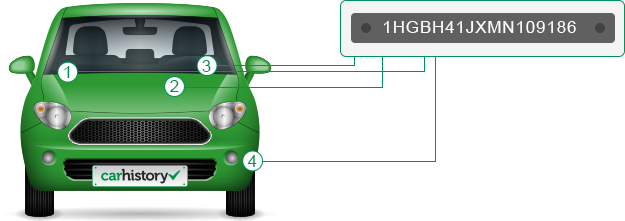
The vehicle identification number (VIN) is composed of 17 characters (digits and capital letters) that act as a unique identifier for the vehicle. A VIN displays the car's unique features, specifications and manufacturer.
The VIN can be found in a couple of places including on the car's registration label (1), on the compliance plate in the engine bay (2) or on the passenger side windshield (3), or on one of the door posts (where the door latches when it is closed) (4). See the image below:
If you've been considering a strategy to find the best deal on a used car, you'll probably be drawing on a wealth of information from family or friends in the know, perhaps even doing a few prudent internet searches to help you pinpoint a reliable dealership with the most competitive prices.
However, one thing you may not have factored into your careful calculations is that where you live could impact whether you end up with a lemon.
Based on an analysis of cars checked with CarHistory over a 12-month period (2013-2014) we found that an astonishing 10 per cent of used car buyers could be in for an unpleasant surprise1.
Negative CarHistory results can be down to a number of factors, the most common of which include vehicles being written-off, insurance claims and odometer rollback.
"Our 12-month analysis showed that 205,000 of all used cars had been written off, another 30,000 had insurance claims and another 27,500 had been wound back," says CarHistory's Nandie Volkland. "Finding out a car's history before buying helps consumers to make an informed choice and avoid being scammed."
Odometer rollback is a technique used to deceive buyers by making the vehicle appear as though it has clocked less kilometres than it really has.
"Odometer readings are a significant factor for consumers when making a decision to purchase a second-hand vehicle and consumers are entitled to feel confident that the reading is accurate," said Paul White, Commissioner for Consumer Affairs in SA.2
In states such as Queensland, odometer tampering can result in a maximum fine of $23,560 or even two years imprisonment whether you are a motor dealer or not2.
It might be hard to believe, but even across our fair country, there are some states whose reputation precedes them when it comes to dodgy car dealings. While this won't be the case for every dealership within the state boundaries, the best way to protect yourself from getting stung is to check out the CarHistory report of the vehicle you're interested in.
Our CarHistory analysis also returned the three worst states in which to buy a used vehicle, with Queensland taking the top sport with 13.8 per cent negative reports. The Sunshine State was followed closely by South Australia (13.6 per cent), and Victoria (12.3 per cent)1.
By contrast, the Australian Capital Territory emerged with a respectable result of only 7.5 percent negative reports.
"We're warning consumers to protect themselves by getting an independent inspection by a mechanic and getting a CarHistory Report with buyback insurance*," adds Ms Volkland. "The report covers odometer readings from trusted sources - an important consideration as any vehicle with its odometer wound back will not carry the manufacturer's warranty."
*Buyback Insurance is no longer offered with this product
1CarHistory, Worst of the Worst used cars revealed. Accessed July, 2015. Data based on snapshot in time of the CarHistory automotive bureau which collates information from third parties.
2Queensland Government, Motor industry breaches and penalties. Accessed July, 2015.